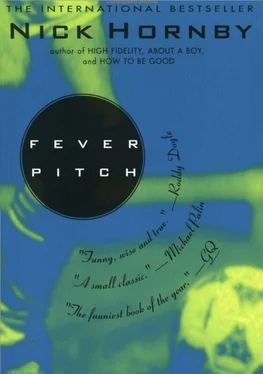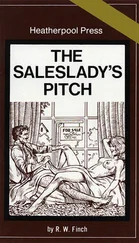I didn’t think all that at the time, of course, because as far as I knew, a 2-0 home victory over Brighton had no particular significance, and there would be another last game for us some other time—but then, our début together had been equally inauspicious. It’s best just to leave us there, the three of us—Dad topping up his tea with the contents of his hip flask and grumbling about still watching the same old bloody Arsenal, me shifting around uncomfortably in my seat, hoping that somehow things would get better, and Jonathan, still small and pale with cold and, for all I know, wishing that his brother and his father had found a different way to sort out their problems in 1968.
ARSENAL v MANCHESTER CITY
24.2.81
I got lost around this time, and stayed lost for the next few years. Between one home game (against Coventry) and the next (a midweek game against Manchester City), I split up with my girlfriend, all the things that had been rotting away inside me for who knows how many years oozed out for the first time, I started my teaching practice in a difficult west London school, and Arsenal got a draw at Stoke and a beating at Forest. It was strange to see the same players trotting out that evening as they had trotted out three weeks before: I felt that they should have had the decency to reinvent themselves, accept that the faces and physiques and shortcomings they had had in the Coventry game belonged to another period entirely.
If there had been a match every weekday evening and weekend afternoon I would have gone, because the games acted as punctuation marks (if only commas) between bleak periods, when I drank too much and smoked too much and weight fell off me gratifyingly quickly. I remember this one so clearly simply because it was the first of them—they all began to merge into each other a little after this; Lord knows nothing much happened on the pitch, apart from Talbot and Sunderland trundling in a couple of goals.
But football had taken on yet another meaning now, connected with my new career. It had occurred to me—as I think it occurs to many young teachers of a similar ilk—that my interests (football and pop music in particular) would be an advantage in the classroom, that I would be able to “identify” with “the kids” because I understood the value of the Jam and Laurie Cunningham. It had not occurred to me that I was as childish as my interests; and that although, yes, I knew what my pupils were talking about most of the time, and that this gave me an entrée of sorts, it didn’t help me to teach them any better. In fact the chief problem I had—namely, that on a bad day there was uproarious mayhem in my classroom—was actually exacerbated by my partisanship. “I’m an Arsenal fan,” I said in my best groovy teacher voice, as a way of introducing myself to some difficult second years. “Boo!” they replied, noisily and at great length.
On my second or third day, I asked a group of third years to write down on a piece of paper their favourite book, favourite song, favourite film and so on, and went around the class talking to them all in turn. This was how I discovered that the bad boy at the back, the one with the mod haircut and the permanent sneer (and the one, inevitably, with the biggest vocabulary and the best writing style), was completely consumed by all things Arsenal, and I pounced. But when I had made my confession, there was no meeting of minds, or fond, slow-motion embrace; instead, I received a look of utter contempt. “You?” he said. “You? What do you know about it?”
For a moment I saw myself through his eyes, a pillock in a tie with an ingratiating smile, desperately trying to worm my way into places I had no right to be, and understood. But then something else—a rage born out of thirteen years of Highbury hell, probably, and an unwillingness to abandon one of the most important elements of my self-identity to chalky, tweedy facelessness—took over, and I went mad.
The madness took a strange form. I wanted to grab that kid by his lapels and bang him against the wall, and yell at him, over and over again, “I know more than you ever will, you snotty little fuckwit!” but I knew that this was not advisable. So I spluttered for a few seconds, and then to my surprise (I watched them as they spewed forth) a torrent of quiz questions gushed out of me. “Who scored for us in the ’69 League Cup Final? Who went in goal when Bob Wilson got carried off in ’72 at Villa Park? Who did we get from Spurs in exchange for David Jenkins? Who … ?” On and on I went; the boy sat there, the questions bouncing off the top of his head like snowballs, while the rest of the class watched in bemused silence.
It worked, in the end—or at least, I managed to convince the boy that I was not the man he had taken me for. The morning after the Manchester City game, the first home game following my trivia explosion, the two of us talked quietly and cordially about the desperate need for a new midfield player, and I never had any trouble with him for the remainder of my practice. But what worried me was that I hadn’t been able to let it go, that football, the great retardant, hadn’t let me act like a grown-up in the face of a young lad’s jibe. Teaching, it seemed to me, was by definition a job for grown-ups, and I appeared to have got stuck somewhere around my fourteenth birthday—stuck in the third year, in fact.
MY SCHOOL v THEIR SCHOOL
January 1982
I’d seen Kes , of course; I’d laughed at Brian Glover dribbling around kids and pushing them over, awarding himself penalties, doing the commentary. And my friend Ray, the deputy head of the school in Cambridge where I was now a Scale 1 English teacher (Cambridge because a job came up there, because I still had friends there, and because my teacher training year in London had taught me that I should avoid London schools if at all possible) had an endless fund of true stories about headmasters who appointed themselves referees for important matches, and sent the fifteen-year-old star striker of the opposing team off in the first two minutes of the match. I was well aware, therefore, of the way schools football encouraged teachers to behave in an astonishingly foolish manner.
But what would you do, if your fifth years were 2-0 down at half-time in a local derby (although admittedly schools football does tend to throw up a number of local derbies), and you made an astute tactical switch at half-time, and the boys pulled one back, and then, bang on ninety minutes, when your voice is hoarse with frustration and impotence, they equalise? You would probably find yourself, as I did, two feet up in the air, fists punching the sky, letting rip with an undignified and certainly unteacherly howl … and just before your feet hit the touchline, you would remember who you were supposed to be, and how old these kids were, and you would start to feel daft.
ARSENAL v WEST HAM
1.5.82
Looking back, it was quite clear that the stuff on the terraces was getting worse and that sooner or later something was going to happen that would change it all, somehow. In my experience there was more violence in the seventies—that is to say, there was fighting more or less every week—but in the first half of the eighties, with Millwall’s F-Troop, West Ham’s Inter-City Firm (and the calling cards that these factions were reputed to leave on the battered bodies of their victims), the England fans and their alleged National Front agenda—it was less predictable and much nastier. Police confiscated knives and machetes and other weapons I did not recognise, things with spikes coming out of them; and there was that famous photograph of a fan with a dart sticking from his nose.
Читать дальше











